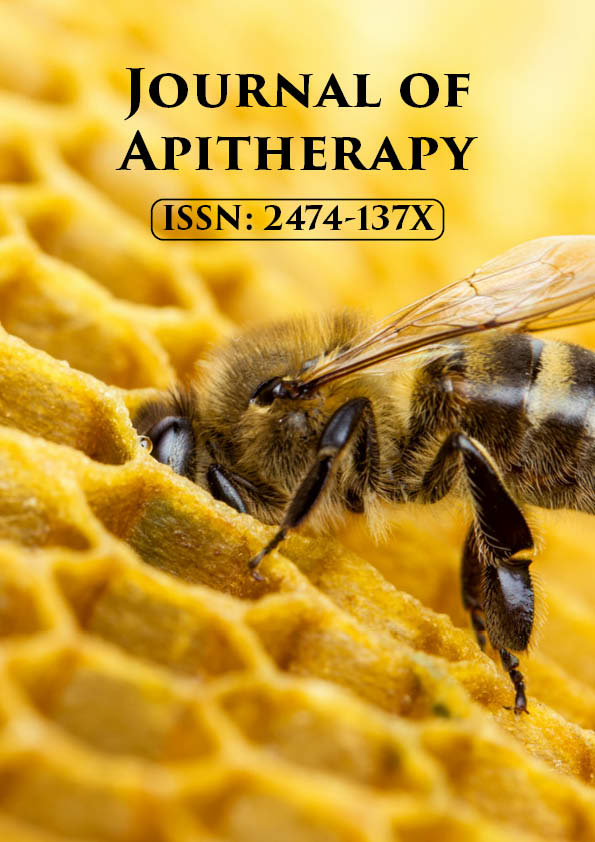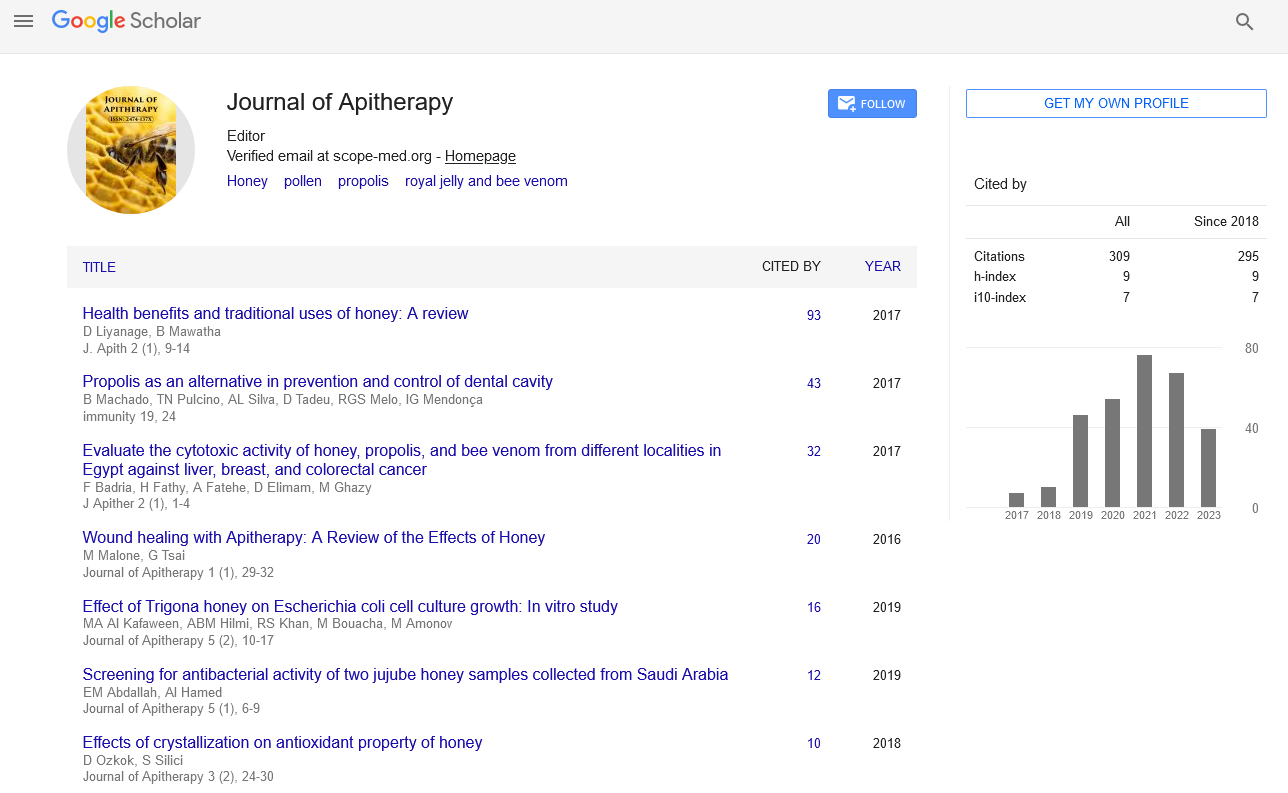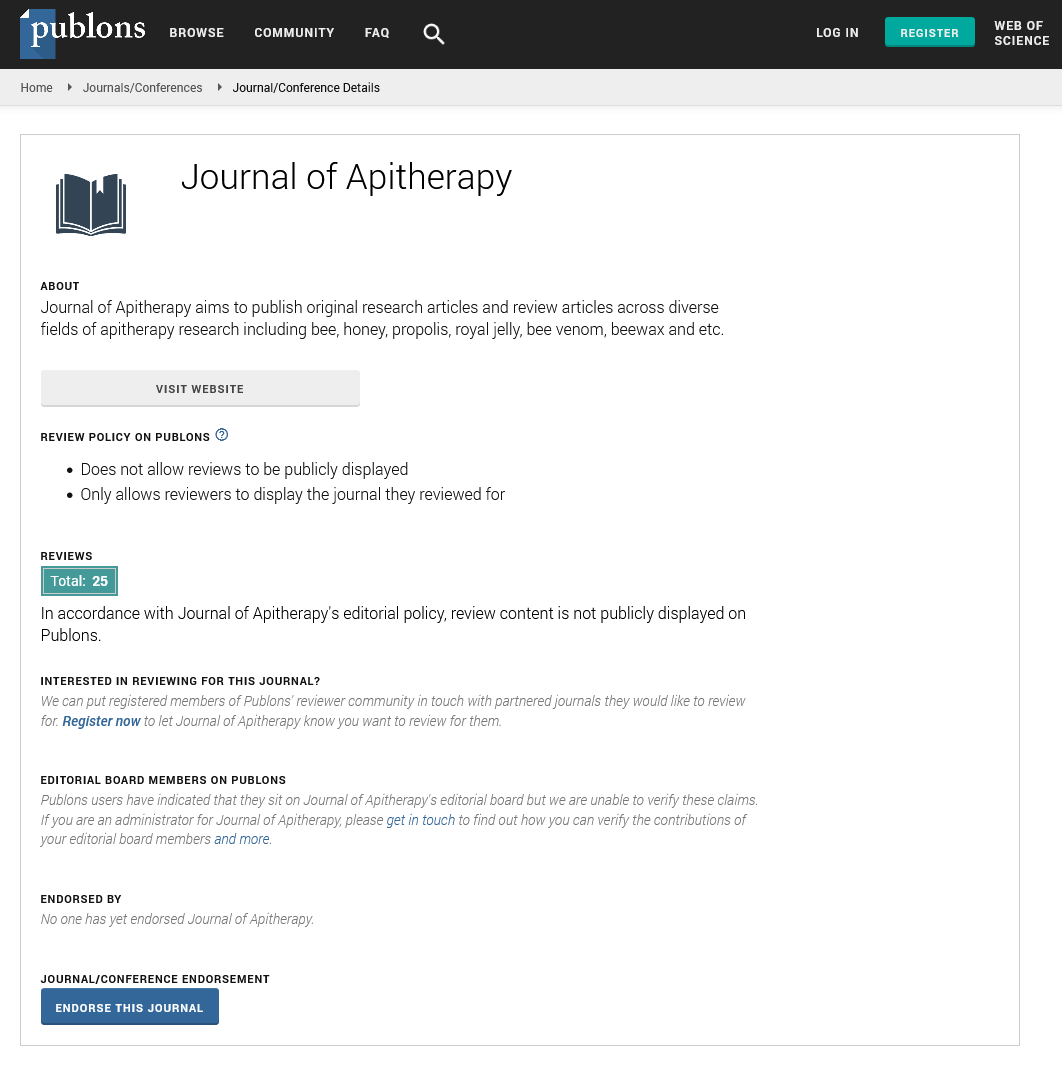Opinion Article - Journal of Apitherapy (2023)
Propolis Glycoproteins: Unveiling Nature's Healing Elixir
Laura Jones*Laura Jones, Department of Pharmaceuical Sciences, University of Science and Technology, Chittagong, Bangladesh, Email: Laura@gmail.com
Received: 03-Aug-2023, Manuscript No. JAPITHERAPY-23-119476; Editor assigned: 07-Aug-2023, Pre QC No. JAPITHERAPY-23-119476 (PQ); Reviewed: 21-Aug-2023, QC No. JAPITHERAPY-23-119476; Revised: 28-Aug-2023, Manuscript No. JAPITHERAPY-23-119476 (R); Published: 04-Sep-2023
Description
Propolis, often referred to as "nature's glue," is a remarkable substance produced by honeybees to protect and maintain the integrity of their hives. Rich in bioactive compounds, propolis has been used for centuries in traditional medicine for its diverse therapeutic properties. Among the various constituents of propolis, glycoproteins have gained attention for their potential health benefits. This article explores the fascinating world of propolis glycoproteins, shedding light on their properties, mechanisms of action, and the growing body of research supporting their role in health and wellness [1,2].
Understanding propolis
Before diving into the specifics of propolis glycoproteins, it's essential to understand what propolis is. Propolis is a resinous substance that bees collect from tree buds, sap flows, and other botanical sources. Once gathered, bees mix propolis with their enzymes and beeswax to create a sticky and highly bioactive material. The primary role of propolis in the hive is to seal gaps, reinforce the hive structure, and protect it from environmental threats, such as bacteria, viruses, and fungi. This defense mechanism ensures the safety and well-being of the bee colony. [3, 4].
Properties and benefits of propolis glycoproteins
Immune system support: Propolis glycoproteins have been shown to modulate the immune system. They can enhance the production and activity of immune cells, such as macrophages, natural killer cells, and lymphocytes, which play a critical role in defending the body against pathogens and abnormal cells. By bolstering the immune response, propolis glycoproteins may help the body fight off infections and diseases more effectively [5].
Antioxidant activity: Propolis glycoproteins exhibit powerful antioxidant properties. Antioxidants help neutralize harmful free radicals in the body, reducing oxidative stress and the risk of chronic diseases. The combination of glycoproteins with other antioxidants present in propolis, such as flavonoids and polyphenols, contributes to its overall antioxidant capacity.
Antimicrobial properties: One of the most remarkable aspects of propolis is its ability to protect beehives from microbial threats. Propolis glycoproteins, in combination with other compounds, possess antimicrobial properties.
They can inhibit the growth of bacteria, viruses, and fungi, making propolis a potential natural remedy for various infections. Research has even shown its effectiveness against antibiotic-resistant bacteria [6].
Wound healing: The wound-healing properties of propolis glycoproteins have been the subject of scientific investigation. These compounds can accelerate the healing of skin injuries by promoting tissue regeneration and reducing inflammation. Consequently, propolis-based topical formulations are used to treat cuts, burns, and other skin conditions.
Anti-tumor activity: Emerging research suggests that propolis glycoproteins may have anti-tumor properties. They can inhibit the proliferation of cancer cells and induce apoptosis, programmed cell death, in cancer cells. However, more extensive research is needed to understand their full potential in cancer therapy.
Gastrointestinal health: Propolis glycoproteins have been investigated for their potential benefits in gastrointestinal health. They can help protect the gastrointestinal mucosa, reduce inflammation in the gut, and maintain a healthy gut microbiota. These properties may be valuable for individuals with digestive disorders.
Applications of propolis glycoproteins
Propolis glycoproteins are available in various forms, including:
Dietary supplements: Propolis glycoprotein supplements are available in capsule or tablet form, making it convenient for individuals to incorporate them into their daily health regimen.
Topical products: Propolis-based creams, ointments, and balms are used for skin care and wound healing. These products may contain propolis glycoproteins to harness their therapeutic properties.
Throat lozenges: Propolis glycoprotein-infused throat lozenges are used to soothe sore throats and provide immune support during cold and flu seasons.
Oral health products: Propolis glycoproteins are added to some toothpaste and mouthwash formulations to support oral health and reduce inflammation in the mouth.
Dietary additives: Some food and beverage products contain propolis glycoproteins as dietary additives to offer potential health benefits when consumed.
It's important to consult with a healthcare professional before starting any new supplement or treatment regimen, especially if you have underlying health conditions or are taking medications.
References
- Dumitru CD, Neacsu IA, Grumezescu AM, Andronescu E. Bee-derived products: chemical composition and applications in skin tissue engineering. Pharmaceutics 2022;14:750.
[Crossref] [Google scholar] [pubmed]
- El-Seedi HR, Eid N, Abd El-Wahed AA, Rateb ME, Afifi HS, Algethami AF, et al. Honey bee products: preclinical and clinical studies of their anti-inflammatory and immunomodulatory properties. Front Nutr 2022;8:761267.
[Crossref] [Google scholar] [Pubmed]
- Münstedt K, Männle H. Using bee products for the prevention and treatment of oral mucositis induced by cancer treatment. Molecules 2019; 24:3023
[Crossref] [Google Scholar] [pubmed]
- Olas B. Bee products as interesting natural agents for the prevention and treatment of common cardiovascular diseases. Nutrients 2022; 14:2267
[Crossref] [Google Scholar] [Pubmed]
- Münstedt K, Männle H. Bee products and their role in cancer prevention and treatment. Complement Ther Med 2020; 51:102390
[Crossref] [Google Scholar] [Pubmed]
- Luo X, Dong Y, Gu C, Zhang X, Ma H. Processing technologies for bee products: an overview of recent developments and perspectives. Front Nutr 2021; 8:727181
[Crossref] [Google Scholar] [Pubmed]







